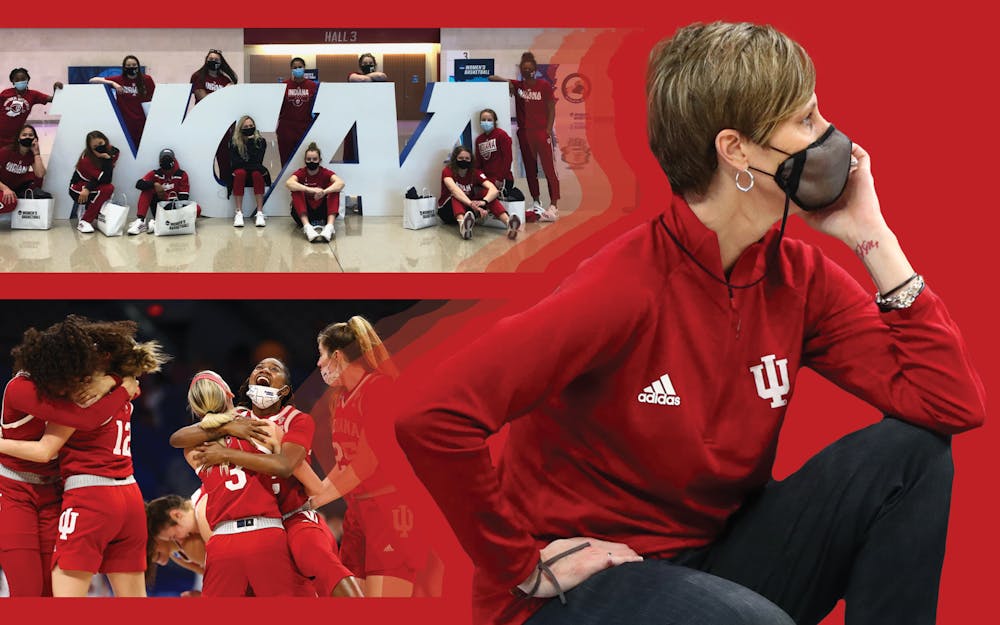Everything came together for Indiana women’s basketball in the 2021 NCAA Tournament.
Nothing was normal that year. The team spent the entire tournament in two separate COVID-19 bubbles, capping off a year full of testing where few players saw their families. But with no one else to talk to and plenty of time for team bonding, it was a perfect storm.
Indiana performed better that March than it ever had before.
Two years later, it remains the best run in program history, despite both teams since receiving higher seeds. Indiana reached the Sweet 16 in 2022 and lost in a shocking upset in the round of 32 at Assembly Hall in 2023.
The Indiana Daily Student talked to all five starters of that run for this oral history. Players are listed by their years and positions during that season.

After capping off its 2021 regular season with nine consecutive victories, Indiana had momentum for the Big Ten Tournament, where it entered as the No. 2 seed. But following a rather surprising loss at the hands of Michigan State in the first round, the Hoosiers had to wait four days to find out their seed and opponent for the NCAA Tournament, and 11 days until their next game.
Aleksa Gulbe, junior forward: I was nervous (waiting for our seed), not going to lie. My freshman year, everything got leaked. We knew we were in as a bubble team, and sophomore year, because of COVID, everything stopped. I hadn’t had any experience of what that feeling is like when you really don’t know.
Mackenzie Holmes, sophomore forward: I didn’t get the tournament (as a freshman). We lost in the Big Ten Tournament, so we were all eager to play, and just getting an opportunity to actually play in the tournament, I didn’t really care if it was in the bubble or not.
Nicole Cardaño-Hillary, senior guard: I remember the coaches saying this is the biggest time where we have to leave the games behind and not really think about it. You're facing teams that you haven't seen before, and you really have to change that mindset to be able to adapt on the go and understand that any game can be your last for that season.
Grace Berger, junior guard: We were obviously following the COVID year, a year when we were days away from the selection show when we were confident we were going to be a top four seed and hosting. That got taken away from us, so the anticipation was that much more built up.
Cardaño-Hillary: A lot of the starters were playing big minutes throughout the whole season. I feel like that (11-day break) always helps and being able to recover and get your mind and your legs back is something that is very needed.
Berger: There’s always two weeks between the end of the Big Ten Tournament and the selection show at the start of the NCAA Tournament. The Michigan State loss was good because we were able to really focus on ourselves, focus on our weaknesses that were exposed in the Big Ten Tournament. It made us feel super confident as we headed into the NCAA Tournament.
Gulbe: I was talking to the girls, like, when we see Indiana on the screen, what are we going to do? We were like, we’re gonna dance like “Single Ladies,” but the screen froze on ESPN and nobody saw us dancing.
Holmes: That sounds like Aleksa. No, I don’t remember that.
On Selection Sunday, Indiana was awarded a No. 4 seed for the NCAA Tournament. In a normal year, it would have meant the Hoosiers played the first two rounds at home in Assembly Hall, but due to COVID-19, the entire tournament was instead played in two bubbles in Texas.
Ali Patberg, senior guard: At the time, we had never had a seed that high. Two years prior, we went out to Oregon and until that day, we didn’t know if we were in the tournament or not. To have that feeling where it’s like we knew we were in, we didn’t have to worry about anything.
Cardaño-Hillary: After last year (2022) and going through the NCAA Tournament in the normal sense, it was like, well, we got this rank, but we're all traveling so the advantage wasn't really anywhere.
Berger: We had never hosted before. We only had that experience my freshman year where we went out to Oregon as a No. 10 seed. Our mindset was just grateful we get to play in the NCAA Tournament on the biggest stage.
Gulbe: For us, being up there among the best, it was kind of like a proud moment.
Cardaño-Hillary: It was nice because you could look at it as not having pressure, whether you’re the first seed or second seed playing at home and not wanting to disappoint your fans.
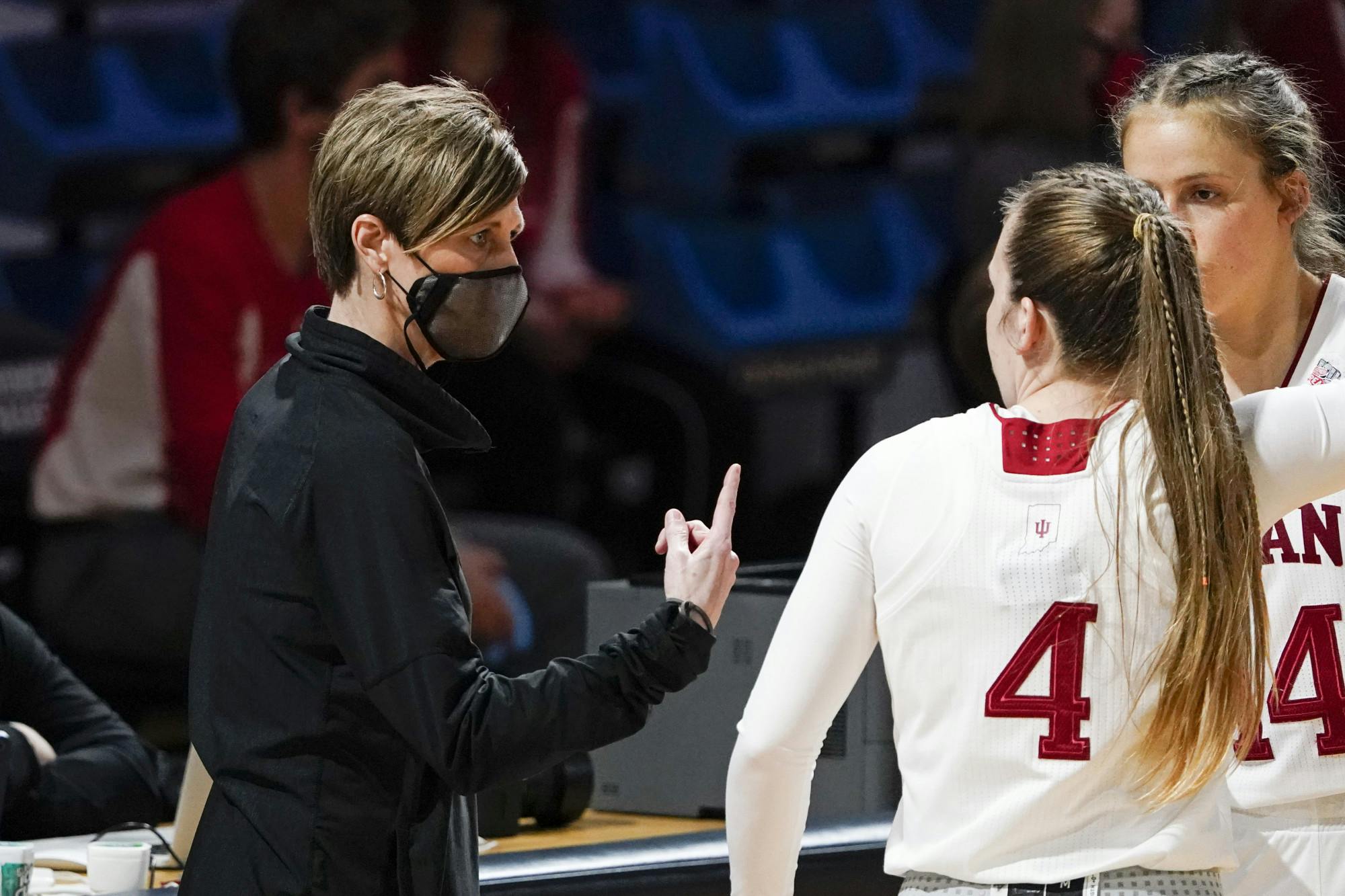
Indiana’s first-round matchup was against No. 13 seed Virginia Commonwealth University at the University of Texas-San Antonio’s Convocation Center. It took the Hoosiers a few quarters to shake off the rust, going into halftime with just a 5-point lead.
Cardaño-Hillary: It's really funny because I came from George Mason University. (Cardaño-Hillary transferred to Indiana before the 2020-21 season.) VCU and George Mason are in the same conference. I went through years playing VCU twice a year. It was kind of weird. It was just life going back around.
Gulbe: It’s March Madness. We know that after a year of not having fans and now playing in Texas, it’s going to be a completely different game than playing at home or any arena that we’re used to.
Cardaño-Hillary: We may be ranked higher than them, but on any given Sunday, you know, as they say, anyone can win. We definitely didn't look down on anyone by any means.
Holmes: It’s similar to a normal nonconference game as far as preparation goes, at least for the first round game, because you have that time to prepare like we would in the regular season. I think when it gets a little more tricky is when you have that quicker one or two-day turnaround in between games.
Gulbe: (Associate head coach Glenn) Box took over the scout right away, saying how (VCU) are a team who moves a lot, who attacks hard, who goes hard for the rebounds and presses. A ‘you never know what’s going to happen’ type of team.
Patberg: (Head coach Teri Moren) always says the first game is the most important, especially in the bubble, when we’re in an environment we’ve never been in, circumstances we’ve never seen.
Holmes: There was no homecourt advantage, it was a neutral court in the middle of Texas.
Patberg: The beginning of that game, we were rusty. It felt weird.
Gulbe: At halftime, we came back to the locker room, and we were talking to each other about how we feel super slow, that things weren’t going our way. In the second half we got our rhythm going.
Cardaño-Hillary: That year, the history of that team was that there was one quarter where we just take off.
Indiana’s defense came alive against VCU. The Hoosiers held the Rams to just 32 points, the lowest ever by a Big Ten team in the tournament. Indiana won 63-32 behind a 22-3 fourth quarter in which VCU didn’t make a field goal. As was the case throughout the entire tournament, Berger, Patberg and Holmes carried the offensive, scoring 20, 17 and 14, respectively.
Cardaño-Hillary: Coach Moren was definitely a stickler about defense, because defense creates offense. When you have a defense, it creates energy.
Holmes: We were really a defensive-minded team, more than any team I’ve been on since, to be honest. We took that as a challenge every game to guard the crap out of teams.
Patberg: We knew the dynamics of our team. We had Mack, obviously. I was the three with Nikki as point and I wasn’t a lethal three-point shooter. We knew we were going to have to defend every single game to be in it because we might not be able to score 80 points.
Berger: You can’t always control whether your shot goes in. You can’t always control what calls the ref might make. But you can always control your effort on the defensive end.
Holmes: I don’t think any of us were ever worried.
Patberg: A win is a win. We got it under our belt and felt comfortable.
Gulbe: Right after the game, the coaches were like, ‘OK, onto the next one.’
In the second round, Indiana matched up with No. 12 seed Belmont University, which had shocked No. 5 seed Gonzaga University in the first round.
Cardaño-Hillary: This is what we were saying, you know, anyone can be beat, it doesn't matter. Your ranking doesn't matter. It’s who shows up that day.
Patberg: Anytime, anyone can win, and if we don’t bring our A-game, we’ll go home. There was a sense of urgency, and there would have been regardless of who we were playing.
Gulbe: We already knew they were a really good 3-point shooting team. In the post we’re used to playing physical, but this game was the type where we needed to bend our knees, playing one-on-one defense out on the arc.
Once again, Indiana ran away for a 70-48 victory behind a balanced attack: 17 points from Berger and 13 from Holmes and Patberg.
Holmes: Having people who can score 10-plus points a game is super important. When one player isn’t having a good night, you can count on another one. That year we had five people that could score 10-plus points a game.
Patberg: It gave us confidence. You want everyone around you to be good because it lifts everybody else up.
Berger: You might be able to get away with it in the regular season, but in the postseason you need everyone to bring their A-game. We certainly had that in 2021.
Gulbe: Even though we won by quite a lot, I remember it being a physical game. I remember us keeping our foot on the pedal, not even looking at the score. Even if we’re up by 15, the game doesn’t stop until there’s no time left on the clock.
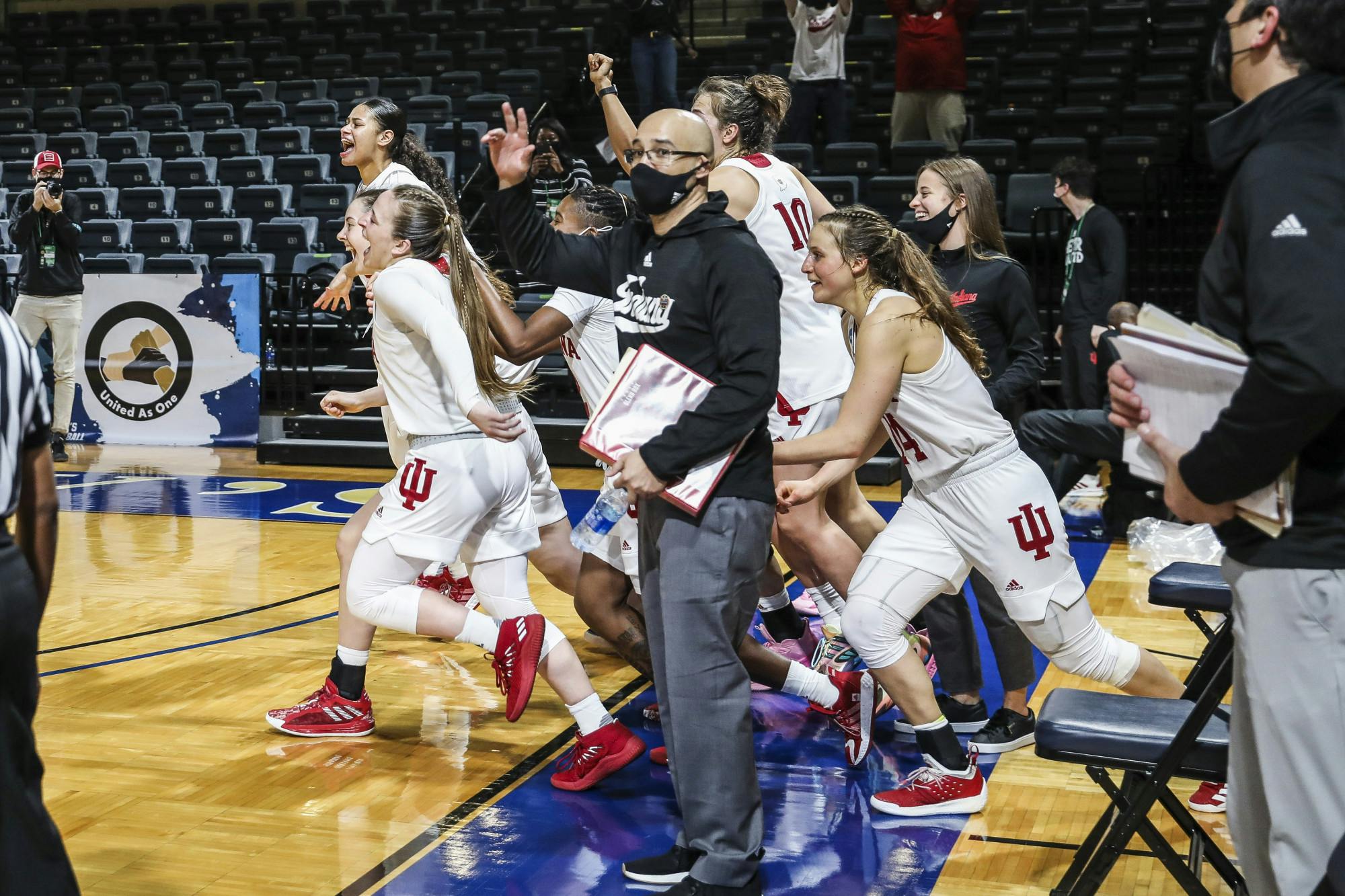
After closing the victory, Indiana was into its first-ever Sweet 16. Celebration ensued. The whole team waited with water bottles for Moren to walk in. Moren walked in with water of her own, and they all doused each other.
Gulbe: The water bottles were emptied. Everybody was splashing water on everybody, coaches and everything. I had a film camera with me, so we took a picture on my film camera.
Holmes: There’s really nothing like that. Whenever you do something for the first time in program history, whatever it is, it’s super exciting. You just remember the people you did it with.
Cardaño-Hillary: It was an insane, unreal feeling. I will remember that forever and it was super exciting just to see all the hard work that we put in paying off. Being able to celebrate alongside those girls and the coaches — we'd been together throughout the whole season and it was magical. It was rewarding for everyone: the coaches, the staff, the players, the managers, the practice players that helped us get strong and be able to go up against all these different teams.
Berger: My freshman year, just winning one NCAA Tournament game was a huge deal. I just thought it would be the coolest thing ever if we could make it to the Sweet 16. Two years later, to actually be in that situation was super exciting.
Holmes: The circumstances of the season, with it being the bubble, it was just very validating because we had to sacrifice a lot that year. We didn't go home for Christmas. We tested every day.
Gulbe: After the game we walked out before going to the bus. You couldn’t hug anybody or high-five anybody. There was literally a barrier between how far the fans could go and how far the players could go. I remember walking down toward the bus and we heard people applauding. We started walking towards them and it was our parents who were cheering for us.
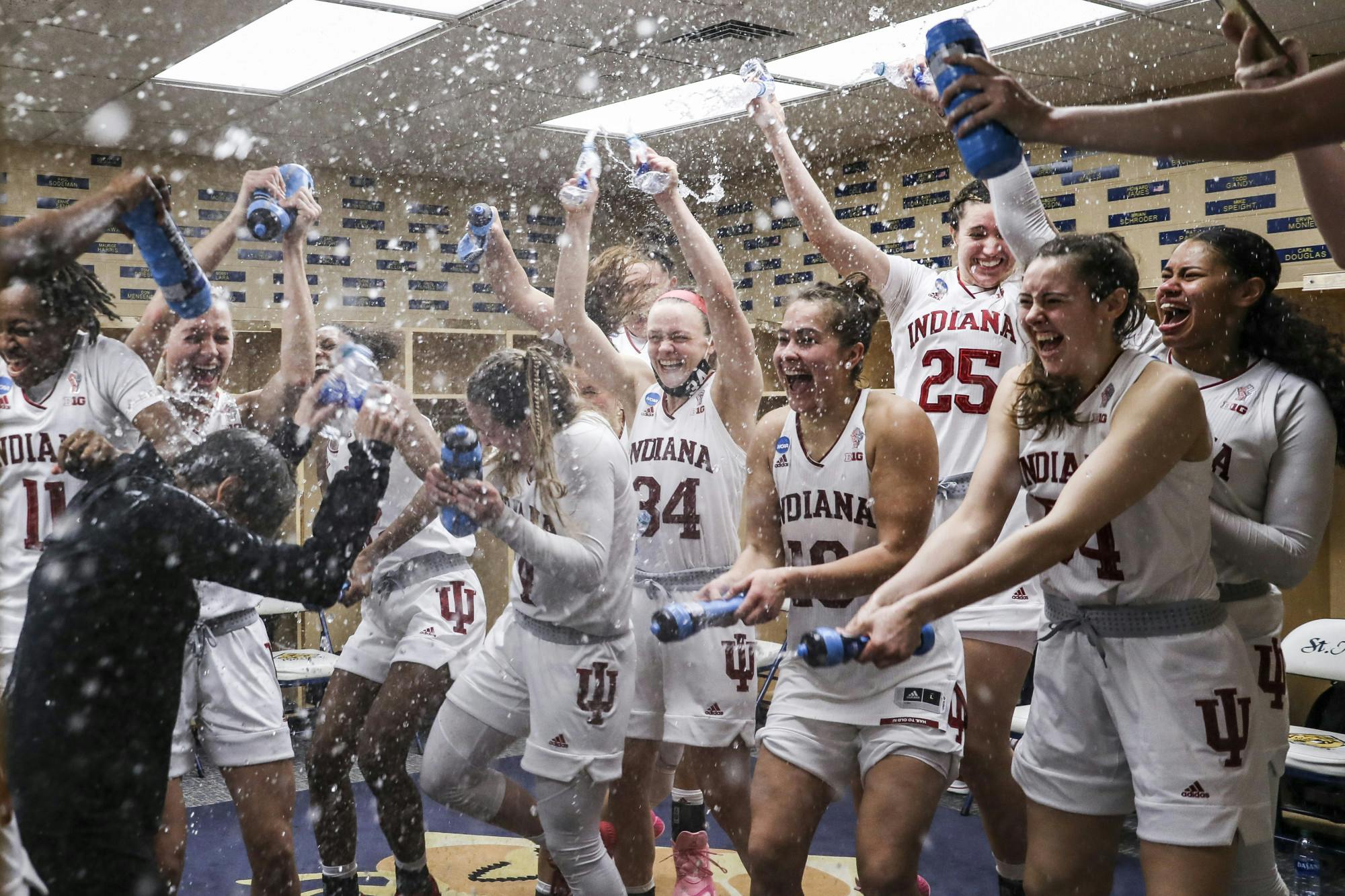
Indiana had a few days off between games, providing more time to prepare for its next round. Meanwhile, the team had to move to a different hotel and a different bubble. Due to COVID-19, life off the court was getting strange.
Cardaño-Hillary: We were in different gyms for both of the games previous, but we got to the main stage for the Sweet 16 in the Alamodome.
Holmes: We were in lockdown. My family couldn’t come see me. The food was horrible. I probably lost close to 10 pounds being there for three weeks. We got fed, but what we got fed was atrocious food and we couldn’t order out from anywhere.
Gulbe: Every team in the hotel had their own floor. We couldn’t just randomly go downstairs; we couldn’t order something. It all had to be coordinated with our guidance person. If we wanted to go for a walk, there was a special 10-minute walk near the COVID testing place.
Cardaño-Hillary: We had ‘yard time,’ is what we would call it. We were like in a prison, and we just get to be outside for a couple minutes.
Gulbe: Literally taking a bus to go for a walk.
Cardaño-Hillary: They had to coordinate that. We had certain times we would go.
Holmes: My dad was like, ‘Can I buy you guys smoothies?’ So, he would go and pick up 30 smoothies like four times and bring them to the hotel. He’d drop them off to the person at the front desk and they would bring it to us.
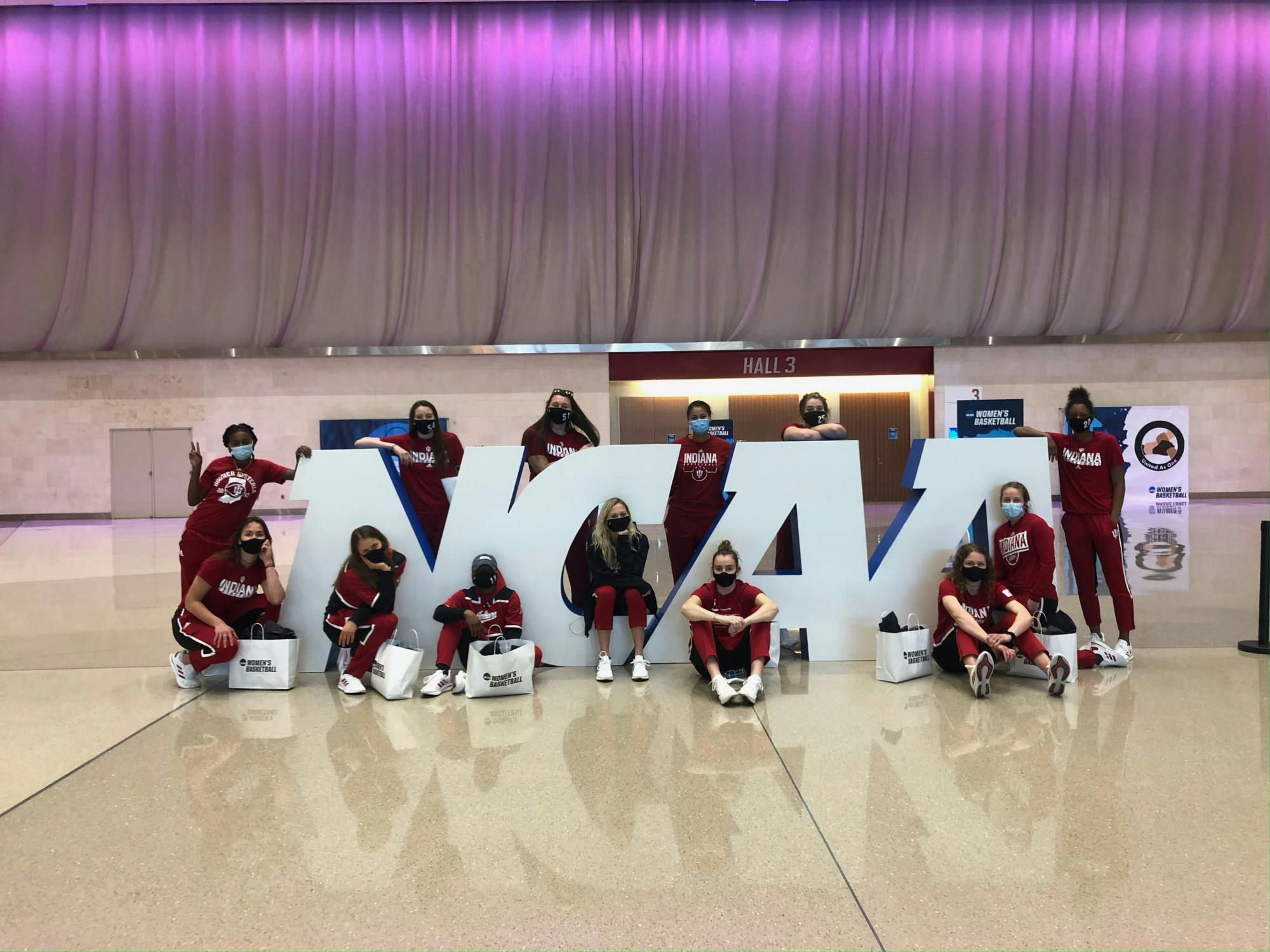
Patberg: We would go as a group and they would test us but then we would have to wait. We would just sit together on the floor and the things that we would do, the things we would talk about — we would stay there for like an hour. You name it — dance contest, everything we did together. Coaches, staff, players.
Berger: We had some false positives. They would have to get retested and would be taken off by themselves into a separate room. That happened a couple of times, and everyone was always nervous when that happened, but thankfully it was never actually positive.
Cardaño-Hillary: Granted, I will say that was a lot of time we spent together that made our team so much closer than teams that didn’t have to deal with that in other years. Even with the coaches and everything, we just had to see each other so much that it was like let’s not talk about basketball, let’s talk about life.
Berger: A lot of us couldn’t see our families, couldn’t see our friends, we weren’t having in-person classes. The only people we were having contact with were each other. We were honestly kind of fortunate because the average person didn’t even have that large of a group they could be around.
Patberg: It’s just cool, the bonds you made just because of that. Literally, we were sitting on the floor on X’s. We would get off those X’s, we didn’t follow the rules.
Holmes: It was hard to make sense of a lot of things during that year. But the validation of winning made it so much better. And the memories — I would never say this in the moment but looking back it was probably the most fun I’ve had.
Next up: No. 1 North Carolina State University in Indiana’s biggest challenge yet for a shot at the Elite Eight. The Hoosiers were looking for their first tournament win over a No. 1 seed in the Wolfpack, who were led by Second-Team All-American and junior center Elissa Cunane.
Holmes: I was nervous knowing how good she was. I was still a sophomore. Just a baby at that point, still maturing.
Gulbe: Obviously, Cunane was a great player. We had a special defense for her that Coach Box prepared. I’m not going to go into detail about that.
Cardaño-Hillary: Being the underdog and being in that position, it's a dangerous spot to be in for NC State. You know, playing against someone like us, we're gonna give it our all.
Berger: We had confidence in ourselves that we expected to win every single game no matter what number was next to their name.
Patberg: We didn’t think anyone thought we could do it, which only helped us have that underdog mentality. But we believed and we knew it was going to be a 40-minute game.
Gulbe: We were watching film so much. We knew everybody’s strong sides and tendencies.
Cardaño-Hillary: We’d made history, but we were ready to keep going and make it again.
Gulbe: Everybody was so mentally prepared, like, if we’ve gotten this far, why not? Why can’t it be us?

Indiana trailed by 8 points after the first quarter and needed to change up its game. The Hoosiers decided to put more pressure on the ball to keep the Wolfpack uncomfortable and worked their way to a 1-point lead at halftime.
Holmes: The thing about our team is we’ll never lose hope. We’ll be down 20 and still think we can come back. It never really phased us.
Cardaño-Hillary: Their point guard, (graduate student Raina Perez), was a big part of their team, kind of a head-of-the-snake type thing. So that was my job.
Gulbe: Their point guards were really athletic. Nikki did a great job of pressing them all game.
Cardaño-Hillary: I was annoying when I played. I tried to annoy the opposing player, trying to figure out what it was she liked to do and try to prevent that.
Patberg: As a leader, it was just one stop at a time. We’ve always been a defensive-minded team. I knew — we knew — that fueled our offense. We were having trouble scoring and needed one stop at a time.
As the game stayed close, Patberg’s leadership helped drive Indiana. At the time, the team wasn’t sure if she would return for one more season. Patberg had started her career at the University of Notre Dame in 2015 and missed her freshman season with a torn ACL.
After her sophomore season, she transferred to Indiana, sitting out for the 2017-2018 season due to the NCAA’s transfer rules at the time. By the 2021 postseason run, Patberg was already in her sixth collegiate year and had one more season in her back pocket due to COVID-19.
Cardaño-Hillary: Ali was able to decide, so it could have definitely been her last season.
Gulbe: To have somebody to play hard for and also knowing what kind of person she is — such a sweet girl who would do anything for you — makes you want to dedicate more and become more selfless.
Holmes: We all trusted her as our point guard and our leader, but what’s special about Ali is she delegates that leadership. She’s never going to say, ‘I’m the only leader on this team.’
Berger: She instills confidence in her teammates. She made sure she was talking each of us up to make us feel confident we can be leaders ourselves. We can have a voice on and off the court.
Gulbe: Her leadership on the court — she’s a great leader. She keeps you accountable, reminds you when she sees you down to hold your head up.
Berger: That made each of us ready when our name was called on the court, no matter if we were taking the biggest free throws of the game or taking a game-winning basket. We knew our leader had our back and that she believed in us.
With 22 seconds left and Indiana up 70-68, Cardaño-Hillary stepped up to the free throw line with a chance at two free throws to ice the game. Heading into that game, she had shot just 50% from the charity stripe all year and now had the most important free throws of her season.
Cardaño-Hillary: There was a timeout right before I was going to shoot the free throws and Coach Moren was like, ‘Nikki’s gonna hit these free throws and we’re gonna do this, this and that.’ And I was just like, OK. Love the confidence.
Patberg: I just looked at her like, ‘Just shoot it.’ For Nikki I felt like she was at her best when there was no stress, so I looked at her and kind of smiled.
Cardaño-Hillary: Ali and I, we’d be practicing free throws. I’d be like, I just have to shoot it. It’s just a shot, shoot it. And she’d come up to me at free throw lines throughout games and tell me, “Just shoot it.”
Patberg: When she made the first one, I was like ‘please,’ because I knew the percentages. But I never didn’t think she was going to make it either.
Cardaño-Hillary: After that first one, I made it and I was like, ‘OK, you can make these.’
Gulbe: After Nikki hit those free throws, I was confident that the game was ours.
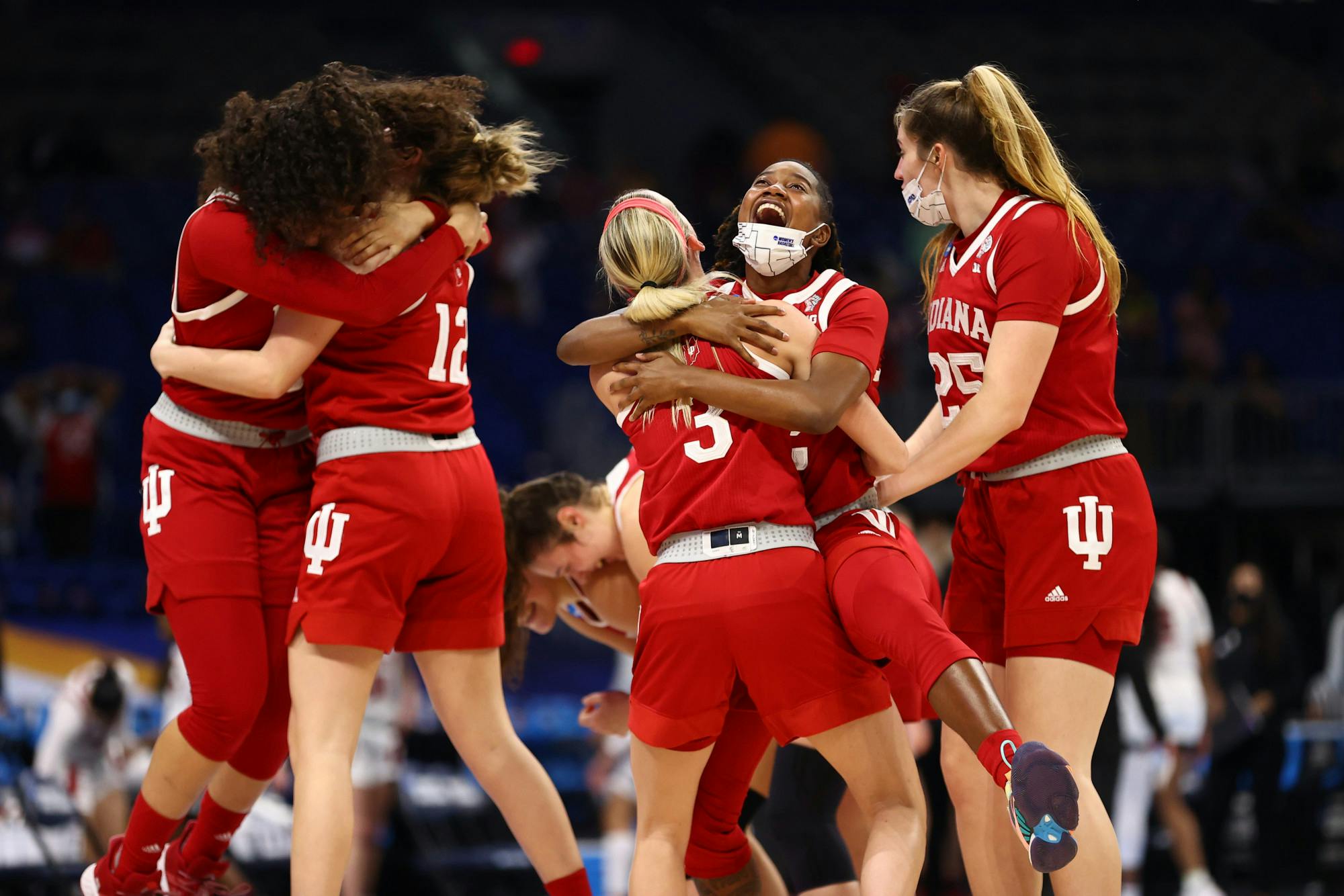
Cunane shot and missed the game-tying 3-pointer. Indiana closed out the victory, 73-70, with all five starters scoring double-digit points. The Hoosiers had beat NC State to make their first, and at this point only, Elite Eight in program history. It was time to celebrate again.
Gulbe: She shot that 3-pointer. It was off and I was like, ‘Wow, this is crazy.’ I cannot even explain that moment, like, wow, we really got into the Elite Eight.
Cardaño-Hillary: I had gotten interviewed by (ESPN’s) Holly Rowe and that was exciting, but I was also super excited to go celebrate with my team. I ran back over after taking my headset off and I look up and my parents were there, and my grandparents, and that was super emotional.
Holmes: Playing in the tournament was something I dreamed of since I was young. That was a big reason why I picked IU because the opportunity to do that year in and year out was really important to me. It was super special knowing we had made history and no matter what happened, that couldn’t be taken away from us.
Cardaño-Hillary: I was probably the one that was most shocked. When I had first gotten to Indiana, we’re watching film and Coach Box was saying in the NCAA Tournament, we can’t play this type of defense. I remember looking around and everyone’s nodding, but in my head, I was thinking the NCAA Tournament? We’re already thinking about it? Coming from a smaller school like George Mason, of course that’s your hope. It just being talked about like that was so exciting.
Gulbe: When I came to the States, I didn’t know anything about the NCAA. I knew UConn. I knew Baylor. I knew North Carolina because of Michael Jordan. That’s it. I didn’t really know anything. When I signed to Indiana, yes, it’s a Power 5 school in the middle of the Big Ten and all that, but I never thought I was going to be part of this journey. Making it to the Sweet 16, making it to the Elite Eight, at that moment, I got a little bit emotional.
Berger: I always thought the Sweet 16 would be the coolest thing in the world. Making it a step further to the Elite Eight is something that’s unheard of for the IU women’s basketball program. To be there, to be one of the last eight teams standing in the country with a group that means so much to you, made it that much more special.
Patberg: It was my fourth year here. How we built (the program), the hard work, doing everything the right way. These people, Coach Moren and Coach Box, everybody, top to bottom, are great people. No one deserved it more than them and our program and our fans.
Cardaño-Hillary: I got tons of water poured on me because my teammates had planned it. Then we ran into the locker room, again waiting for the coaches to come in and we were all getting our bottles ready.

Gulbe: Everybody’s jumping, everybody’s singing “Indiana, Our Indiana.”
Patberg: It was one of a kind. I think I cried multiple times because I knew what it took to get to that point.
Gulbe: When coaches started coming in, everybody’s splashing water everywhere, going crazy. Of course, they’re happy, but what do coaches say? ‘We’re not done yet.’
Patberg: It’s the moment you share with everyone around you. How much we love each other, how much we care for each other. That feeling, that emotion, it’s real. It’s genuine. Something you won’t ever forget.
Gulbe: The whole team couldn’t go on one bus. We had to be split up. We were like seven and seven or something like that. That’s how crazy COVID rules were.
Berger: But as soon as we got back to the hotel, we had to start thinking about Arizona and the Elite Eight.
Indiana’s Elite Eight matchup was against the No. 3 seed University of Arizona and junior guard Bendu Yeaney, who played for the Hoosiers from 2017 to 2020.
Gulbe: In situations like that, you talk about her playing us and the coincidence of her team facing us and all that.
Patberg: But at that point, you have a day to prep, you’re not really thinking like, ‘Oh, I need to talk to Bendu.’ At that point, she is competition.
Gulbe: On one of our very controlled walks, I remember walking past Arizona and one of my Latvian friends. I said hi to her and I said hi to Bendu, but we couldn’t really just stand there and talk to each other.
Cardaño-Hillary: I wasn’t there when she was at IU, but it was a good matchup for our team and thankfully our coaches had a little bit of an in knowing one of their main players.
Once again, the game started slowly. Both teams exchanged misses on the first 10 shots. While Arizona would begin to heat up, Indiana never got going from beyond the arc and shot 0-for-9 on the game.
Cardaño-Hillary: We are an experienced team, so we did understand that things like this can happen.
Holmes: You just know that although this game comes with more pressure, you have to treat it like any other game and just play within ourselves. But that’s easier said than done.
Patberg: It was one of those games and you just try your best to get out of it. We shot poorly, we didn’t play well defensively.
Gulbe: When things are not going your way, everybody got frustrated. In the second half we were like, ‘Let’s come out and be better. Let’s do what we do.’ But nothing was really working.
Cardaño-Hillary: There was a specific time we got together and said ‘Hey, we’re fine.’ You can’t get yourself down. We’re very well aware we’re not making shots but that’s OK.
Gulbe: Our defense was so focused on Aari McDonald driving to the basket, we collapsed so much they ended up having open 3-pointers.
Berger: We were going to put Nikki on her full court to try and wear on her legs a little bit, but at the end of the day, you gotta hope she misses and she didn’t miss enough for us to win the game.
McDonald, named a Second-Team All-American after the season, was unstoppable for the Wildcats. She recorded a 33-point, 11-rebound double-double, scoring half her team's points. The Hoosiers, led by 20 from Holmes and 15 from Berger, didn’t have an answer. Their run faltered in a 66-53 loss.
Gulbe: You’re always smarter after things have been done. Looking back at it, we went into stressed-out mode, being frustrated. We were taking shots hoping to get us back in the rhythm and not sticking to the plan. You can’t win games like that.
Patberg: Seeing them celebrate, that was hard. It took a long time to get over that one, but that’s why we play the game. It’s why I’m on staff now. I want everyone to have that winning feeling.
Cardaño-Hillary: There was a lot of silence, and now you’re thinking about those things. What if I could have done this and that.
Patberg: When you look back, did we give it everything we had in the Sweet 16? I don’t know.
Gulbe: Some people were crying. Everybody was frustrated and coaches were frustrated as well. Obviously, they were a good team, but they were beatable.
Holmes: I don’t remember much from after that game other than being really upset and going back to the hotel room and just being sad by myself because we couldn’t be with each other yet.
Cardaño-Hillary: We knew there was a lot to be proud of, and a lot of people were going to have our backs. Making history that year was something that you just can’t not be happy about.

For all the heartbreak of its run ending short of the Final Four, Indiana had the benefit of returning its entire starting lineup for the next season thanks to that COVID year eligibility. Ultimately, the 2022 season didn’t reach the same heights as 2021, with the No. 3-seeded Hoosiers losing in the Sweet 16. But the groundwork had been laid — the program was reaching new heights.
Patberg: Knowing this group had another chance — again, we fell short, but we made history. It’s not the wins, the stats — it's the memories you make and we sure made a lot of them both years.
Holmes: It showed everyone we’re capable. We still fly under people’s radars even though we’ve had some great runs. Coming in here, I wanted to create history like that. To be able to do that was special, but it also made me really hungry for more.
Berger: It’s huge for our program because it’s one thing for Coach Moren to talk about how she wants to make Sweet 16s and Elite Eights and be one of the top teams in the country, but it’s another thing for her to actually back it up with a couple different trips.
Cardaño-Hillary: I specifically remember — this is 2022 — I remember going out and it was the (second-round) game against Princeton. The amount of people when we ran out to warm up that were there — I couldn’t even hear myself. It was definitely a dream come true.
Berger: Somebody has to be the first team to do it. Down the road when we see IU making those Final Fours, winning those Big Ten championships, everyone will look back to that team and realize we did a lot in a difficult year to do things that have never been done at this program.

